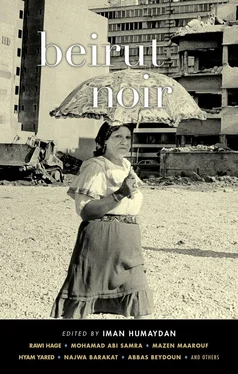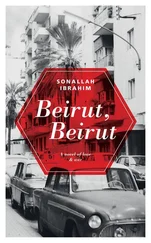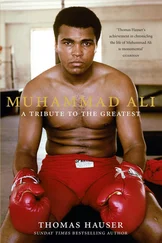You would not believe me if I told you it was love at first sight. Rida was deejaying that night, and from the moment Souraya walked in through the door he knew they were going to spend the rest of their lives together. In the spirit of the glorious past of Club 70, Souraya wore a silver dress that glittered like a disco ball. Everywhere she turned, she was surrounded by light. Rida’s friend Saa’deddine el Abyad (meaning “the white one”) also took notice of her and immediately moved in for a dance. Saa’deddine was a bit of a lowlife who was wanted for numerous infractions of the law. He was called el Abyad because he always wore white linen and white snakeskin shoes, though his heart was far from it.
Rida knew that he had to move in quickly. He picked up his new Cypress Hill album and put on “Insane in the Brain.” The crowd roared, started jumping up and down and headbanging. Souraya was thrown to the side and it was there and then that Rida reached his arm out to her and they locked eyes for the first time. As Souraya stood up, she hoped that Rida would not let her go. She hoped, in fact, that he would never let her go. He didn’t. He pulled her up to his deejay stand and, for the rest of the night, they spun records together. By four a.m. they were completely in love with each other and it was so obvious that even Saa’deddine accepted it. There they were, the three of them throwing back shot after shot of vodka, lemon juice, and Tabasco.
Anything seemed possible that night. Hope. Freedom. Rebirth. Immortality. A great warmth fills my heart. It’s so hard to accept how we can be so generous, but also so violent with each other. Club 70 is a microcosmic representation of this city. These walls have seen everything from love to blood. During lulls in the war or periods of relative calm, dancing is what has always brought people together here. With music, differences and religions are forgotten. Bodies brush past bodies and become flesh without cruel histories. And now I too believe that anything is possible.
Today the Great Wall fell and I’m late. I should already be there by now. Today, a new era begins in this part of the world. Today, the Great Wall that the Israelis built in the heart of the Holy Land fell. No one knows how and why. The Apartheid Wall separating the West Bank and Gaza from Israel, seven hundred kilometers in length and eight meters in height, just disappeared. The largest concrete protest banner in the world, covered in layers of writing and graffiti, no longer exists. There is nothing left to protest about. The fences are gone too. So are the roadblocks, checkpoints, and security towers. The news is only just beginning to spread. Some people are panicking, others are rejoicing. Most are calling it an intervention from God, some an alien invasion. Souraya never had a chance to meet me because I am on my way to Mount Carmel. I am to be part of the new generation of Palestinians and Israelis who will find each other and make peace once and for all. I feel so content to feel so needed.
As I climb up into the sky, I begin to summon the dead all around me. The dead who never received proper funerals during the wars. Whose bodies were left to rot. Whose souls were doomed to roam streets, confused, angry, and bitter. I call upon those in the mass graves here as well as in Syria and Iraq. I am building my army of forgotten innocence. It is our time now. It is time for a new way of life. It will not come easily, but it will happen. No more assassinations. No more bombs. No more borders. Resources will be plenty. Land will be shared.
I hover on the blue metal railings of the Corniche, facing the sea one last time. Souraya is absolutely devastated and Rida has now heard the news. He’s rushing to her through impossible Beiruti traffic, honking his horn incessantly. Traffic that is not moving. He leaves his car in the middle of Hamra Street and starts to run, weaving his way through narrow roads lined with frail mimosa trees. They will be okay. They will get better. For a while, at least. Until the shit hits the fan again. But that is life, I guess. At least life in Lebanon. One bomb after the other. Life bombs. Love bombs. And bomb bombs. But we are resilient. Because we want to believe in second chances. And it may have very well just arrived.
I turn around and way goodbye to Ain el Mreisseh and the generations of my family who lived there. I take a moment, and from nowhere I hear Rida’s voice. “ If I ever walked into a building and didn’t know which way to turn, I would always go left. If I were lost in a forest and found myself at a crossroad I’d go left. Left. Left is always the answer. Left is always a good choice. ”
Left seems like a good idea now. I stretch my arms out and hug the Corniche. I turn left and make my way south along the coast of the spectacular Mediterranean. Today, borders all around the world will cease to exist. My new army is guided by love. And nothing can stop love. So nothing can stop me. I can almost see Jerusalem from here.
Originally written in English.
Pizza Delivery
by Bana Beydoun
Manara
“Is that even possible? That a person’s arm would remain stretched out, reaching up toward the sky after death... Or am I making that up?” she asked her friend Mark, the doctor.
He said that medically it’s impossible, but added that there’s always a chance that things deviate from their scientifically expected path. But he also added that it’s so rare as to be quasi-hypothetical, and he couldn’t take it any more seriously than the possibility of being struck by lightning as you’re crossing the street. What was the name of that book that she kept borrowing from the school library, Strange and Wonderful Things from Around the World ... or something like that? In one of the volumes there was a picture of a person who was burned, or “turned to charcoal,” as the book put it, immediately after being struck by lightning while sitting on the balcony of his house. Reading about this left her completely lost in thought for quite a while. She wasn’t able to say exactly if this was believable or not, and this doubt threw her into a state of intense disarray, for it had been very important for her — especially at that age — that there be clear and precise answers to everything.
Perhaps was a difficult word for her, even a painful one, and remains so today. Perhaps means that anything, or its opposite, might happen. For her, perhaps was like a big zero that might explode in her face at any moment, like a giant egg that might contain an enormous, savage dinosaur — or that might simply be empty. She couldn’t contemplate which possibility was worse. Ultimately, even proven scientific facts were unbelievable at times. She remembered when her math teacher told her that if a minus sign precedes a negative number, it makes it into a positive number. She never believed this. How could two negatives produce a positive? When she tried to ask the teacher about it that day, she said, “Because that’s how it is.” In the end, she was grudgingly forced to accept this ridiculous fact, if only in order not to flunk. But after this, she went back to the equation every time she wasn’t able to find a convincing reason to explain her own stupidity. For example, this equation might be the perfect explanation for her love for Khalid, even though he’d brought her nothing but trouble — no doubt all of his negatives must have engendered something positive in her heart.
Coming back to the question preoccupying her: Is it possible that the little girl at the Qana massacre died with her arm stretched out to the sky — as she imagined she’d seen it on television? What was she was pointing to...? To something that caught her attention in the sky, perhaps the very same airplane that dropped the bomb on her? Or is this detail her own imagination’s strange addition to the true scene of the massacre? Once she’d read that sometimes your imagination can recreate reality according to your own image of it. For example, if we see a child at a distance, most of the time we presume he’s smiling at us, even if we can’t really distinguish his facial features. But that’s only because in our imaginations we see children as always smiling and, of course, always alive.
Читать дальше












